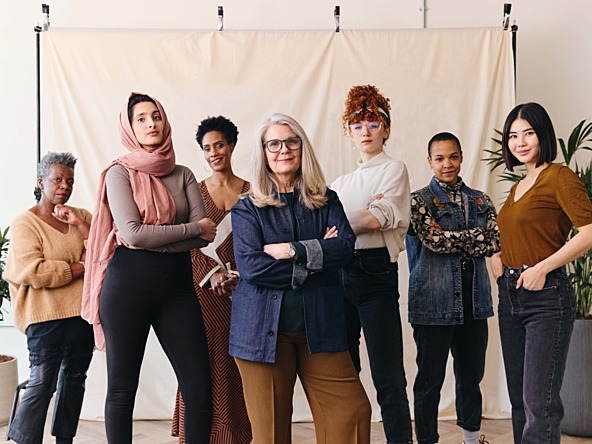Confounding stereotypes: How French femininity is evolving

She is clichéd as a beacon of sophisticated glamour and effortless style, a woman who is seen as never getting fat, wearing her perfume and scarf with savoir faire and has tousled hair with that irresistible slept-in look.
There’s probably not another nationality whose femininity is associated with as much stereotyping as la femme française.
It’s not surprising that French women, like their UK and US sisters, are challenging clichés, sexist expectations, injustices and inequalities, though with a uniquely Gallic ambivalence. This is, after all, a nation with a strong feminist tradition through trailblazers such as Simone de Beauvoir and Simone Weil, while remaining strongly influenced by the Catholic church and family.
There can be an edge to the new wave of feminist activism in the wake of a sluggish response to #MeToo – or #BalanceTonPorc (‘denounce your pig’) as the French call it – ranging from public charges against powerful, prominent men through to feminist writing and grassroots initiatives from Les Colleuses (‘The Pasters’), a group busy gluing anti-misogyny messages across the walls of French cities.
These protests come in a country where, to many outsiders, sexism appears rather blatant. Beyond truly grim femicide figures, sexual harassment is a real issue – in 2022, according to the French government’s first Baromètre sexisme, almost half of women have been subject to sexual acts or propositions at work (compared with 29% in the UK).
The majority of French females met by our organisations in their focus groups are, of course, not activists, but there is nevertheless a clear sense of soft rebellion that extends into the mainstream. Women reject expectations of simultaneously performing the roles of mother, worker and seductress.
Many French women are now in the process of discovering a new kind of freedom that comes from being more in tune with themselves and their needs, rather than aiming for perfection in the eyes of society or employers. In a recent study around employment, the women we interviewed felt that their work had to be part of individual self-realisation. As one respondent pointed out: “It makes no sense to me any more to try to conform to expectations. You’re not making the best contribution to your company and you’re making yourself unhappy.”
A fast-rising cohort of female entrepreneurs, often feeling undervalued in the still-quite-masculine French business world, are finding strength in what are seen as more feminine traits, such as emotions and intuition, and are striking out on their own. An entrepreneuse told us: “I had a business idea of starting a podcast about sustainable fashion but in my former company they always told me I was dreaming. But I did it. I was right all along. Today, I work for myself and I trust my instincts.”
French women’s quest for authenticity often comes with a new lightness rather than stridency, a refusal to take oneself too seriously and to accept failures and imperfections with humour.
This self-acceptance extends to relationships with bodies – not only relating to physical positivity and feeling good in one’s skin, but also in terms of accepting natural processes, from periods through to the menopause. A woman in her 50s told us in a recent focus group: “My body is changing, it’s certainly confusing, but whether it’s night sweats or leaks when I’m laughing, I’ll find a solution. I certainly won’t give up laughing.”
At the other end of the age spectrum, young women want to express themselves authentically and freely through clothes and fashion. ‘Tu es bien stylée’, a compliment about the effort that has gone into defining your own style, is now more frequently heard among girls in their late teens than simply being told you’re ‘chic’ or ‘cool’.
And this self-expression can include dressing in a way that traditional French society can find risqué. Teens tell us that even if their fathers warn them of street harassment when they leave the house in a crop-top or with a see-through dress, they retort: “I wear what I want. If men are pigs, that’s their problem.”
Despite this kind of defiance, traditional concepts of style still have a role to play for young French women. While putting their own spin on fashion, teens are also keen to learn how to dress from their mothers, and proudly show off their stylish mums on Instagram. Beauty and elegance remain values that most French women buy into implicitly, even if the definitions of what is viewed as ‘jolie’ are widening.
But how does advertising and marketing in France adapt to, reflect, or even help further a more authentic, free vision of the French woman? Well, it’s a mixed bag.
Pépite Sexiste, an organisation collecting overtly sexist ads and products, continues to blow the whistle on communications that feature scantily clad women. While one could argue that these adverts are not aimed at women themselves, they do clearly reflect a traditionalist and sexist streak in French society that feminist activists rail against.
Advertising to women, however, seeks to embrace the new French feminism at different levels. Some brands go for a soft, harmonious, somewhat lyrical femininity that would raise eyebrows in the Anglo-Saxon world but can be received quite favourably by French women keen to reconcile long-standing ideas of female beauty with inner satisfaction. “I don’t want to just be beautiful, I want to act beautifully” is the tagline of an Yves Rocher print campaign featuring a sweetly smiling model with a wreath of flowers on her head. In a recent Air France ad, a woman climbs the Eiffel Tower with the longest train on a dress ever seen on a model – it’s about “flying with elegance”.
At the same time, some brands are responding more progressively to the changes in attitude and self-perception which Thinktank and Lemon Lab encounter among French female consumers. In one TV advert, Citroën pokes wry fun at daily irritations in women’s lives. Danone shows females with far-from-perfect bodies in an advert for its Light & Free yoghurts. More radically, cosmetics brand Diadermine reworks both its vocabulary and its perspective on older women with a campaign that seems genuinely interested in shaking up perceptions of wrinkles and embraces them rather as signs of ‘joy, pain and laughter’.
But do such campaigns ring true to les nouvelles femmes françaises? Well, as one respondent told us in a recent group: “These ideas of femininity are liberating. They are also telling me that I can be myself.”
Sabine Stork is co-founder at Thinktank and Jimena Martinez is founder at Lemon Lab.
This article was first published in the October 2022 issue of Impact.

We hope you enjoyed this article.
Research Live is published by MRS.
The Market Research Society (MRS) exists to promote and protect the research sector, showcasing how research delivers impact for businesses and government.
Members of MRS enjoy many benefits including tailoured policy guidance, discounts on training and conferences, and access to member-only content.
For example, there's an archive of winning case studies from over a decade of MRS Awards.
Find out more about the benefits of joining MRS here.











0 Comments